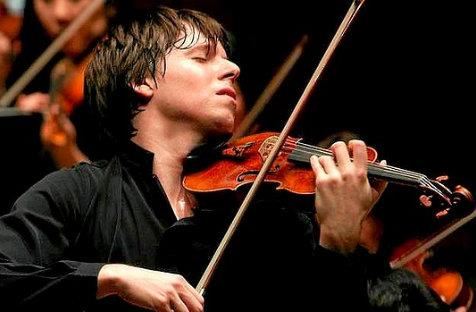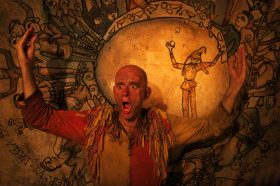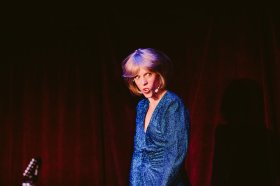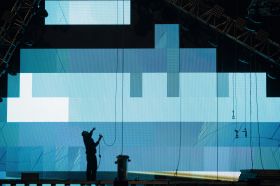The Australian Youth Orchestra is currently touring Germany, the Netherlands and Switzerland, playing in some of the most iconic halls in Europe. Yet just last week the orchestra was in Sydney and Melbourne for concerts with conductor Christoph Eschenbach, veteran didjeridu player William Barton, and America’s much-loved violinist, Joshua Bell.
This is the line-up that will present the same program in Europe as they did in Sydney: Sculthorpe’s Earth Cry, the Tchaikovsky Violin Concerto and The Rite of Spring by Stravinsky. (Melbourne’s third item was Rimsky Korsakov’s Scheherazade).
The first indication that this was not your usual symphony orchestra was the killer pair of shiny black heels worn by a violinist (and a number of similarly funky interpretations of the black-based dress code). Nevertheless I would defy anyone hearing, but not seeing, the musicians to pick that this was a relatively young ensemble, except perhaps for its consistent energy and evident passion for the music.
In a well-structured program, master of the didjeridu William Barton was soloist in Sculthorpe’s Earth Cry. The work began dramatically with an extended orchestral introduction, later followed by what sound like clapping sticks off-stage, but was revealed to be Barton’s hand striking one of the two didjeridus he carried on stage. When seated, Barton blew into the instrument with a deep resonance, then a breathy sound before settling to a long note, above which there were sounds like animal or bird cries.
Eschenbach conducted a performance by the orchestra that was designed to bring out the contribution of each section (and Sculthorpe had written the perfect score to that). The theme recurred time and time again but each time there was something new to hear. The final movement featured a steady crescendo to a magnificent cinematic climax, with the didjeridu still heard through the mass of sound.
It was noteworthy that the players appeared to have a deep understanding of the work and, far from overplaying, maintained great control through a final dimuendo to a unison note. The performance was truly impressive.
Soloist Joshua Bell’s performance would be the focus of the Violin Concerto by Tchaikovsky – but it was apparent from the outset what a good ‘fit’ he was with the AYO. Delicacy and beautiful phrasing gave way to the lush Romantic elements that have made this one of the most popular concertos in the repertoire.
Bell plays without pretension and simply delivers beautiful sound from his Gibson ex-Huberman Stradivarius of 1713, a violin that has an extraordinary history and a rich resonance well suited to the Tchaikovsky. (I interviewed and heard Joshua Bell play in Hong Kong ten years ago, when his Strad was the Tom Tyler, and it was interesting to speculate whether it was his greater maturity or even more expensive instrument that appeared to lend him more emotional depth in his work).
In Australia, as in Hong Kong, Bell has many fans who queued for quite a while to see him after the concert. Certainly they would not have been disappointed by this performance, as he soared through the technical as well as musical demands, and daringly took the violin to almost impossibly high notes in the showy coda.
The orchestra sat transfixed at this point, but was a more than able partner for Bell throughout the concerto, with the music at times reminiscent of ‘Swan Lake’, sometimes syncopated, often mirroring the demands made on the soloist. (It was a tribute to the AYO that Bell, in his turn, listened intently to the orchestra and swayed with the music when he was not playing).
The synchronicity between soloist and orchestra was tangible when, in the final item, Rimsky Korsakov’s Scheherazade, Bell came on stage among the other violinists and quietly assumed the concertmaster’s chair. He naturally took the solo parts in the work (and moved energetically in his seat in the manner of one accustomed to having more room on stage!) but otherwise was simply an integral part of the orchestra.
And a very, very fine orchestra it proved to be. Rimsky Korsakov’s work, with its contrasting scenes, presents a monumental challenge to conductor and orchestra – and this was met. Eschenbach’s ‘micro-conducting’ style was integral to keeping the tempestuous work in check without sacrificing its intensity.
The AYO concert was a great success, as shown by the applause and demands for an encore. Australians can be proud that this youthful orchestra is now representing us in cities that know and expect only the best.
Rating: 4 ½ stars out of 5
Australian Youth Orchestra with Christoph Eschenbach and Joshua Bell
Conductor: Christoph Eschenbach
Soloist: Joshua Bell (violin)
Soloist: William Barton (didgeridoo)
SCULTHORPE Earth Cry
TCHAIKOVSKY Violin Concerto
RIMSKY KORSAKOV Scheherazade
Hamer Hall, Melbourne
5 August





